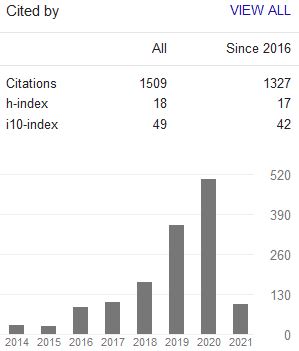SHARI’AH BYLAWS IN INDONESIA AND THEIR IMPLICATIONS FOR RELIGIOUS MINORITIES
Abstract
Keywords
Full Text:
PDFReferences
Abdurrahman, M. “Korban Pertama dari Penerapan Syariat adalah Perempuan (the First Victim of the Application of Shari’a Bylaws is Women). www.islamlib.com, 16/9/2001. Accessed on 6 June 2011.
Asi, R.A. Sulawesi: Aspirations of Local Muslims. Singapore: S. Rajaratnam School of International Studies Working Paper series, 2007.
An-Na’im, A.A. “Religious Minorities under Islamic Law and the Limits of Cultural Relativism.” Human Rights Quarterly. vol 9, no 1 (1987): pp. 1-18.
Assyaukanie, Luthfi. “The Rise of Religious Bylaws in Indonesia.” RSIS Commentaries (22/2007).
Bolong, B. “Formalisasi Syariat Islam di Indonesia (Perspektif Gereja Katolik) (the formalisation of Shari’a Islam in Indonesia (the perspective of Catholic Church). Al-Mawarid. XIV (2006): pp. 146-161.
Buehler, M. “The Rise of Shari’a Bylaws in Indonesian Districts: An Indication for Changing Patterns of Power Accumulation and Political Corruption.” South East Asia Research, vol 16, no 2 (2008): pp. 255-285.
Bush, Robin, “Regional Sharia Regulations in Indonesia: Anomaly or Sympton?.” in G. Fealy and S. White (eds). Expressing Islam: Religious Life and Politics in Indonesia. Singapore: Institute of Southeast Asian Studies (2008): pp. 174-191.
Crouch, M. “Religious Regulations in Indonesia: Failing Vulnerable Groups.” Review of Indonesian and Malaysian Affairs, vol 43, no 2 (2009): pp. 53-103.
Daniels, T.P., Pramono U. Tanthowi. “Muslims and tolerance; Non-Muslim minorities under Sharia in Indonesia.” Cont Islam, no 3 (2009): pp. 317-320.
Eliraz, G. Islam in Indonesia: Modernis, Radicalism, and the Middle East Dimension. Brighton & Portland: Sussex Academic Press, 2004.
Elson, R.E. “Nationalism, Islam, ‘Secularism’ and the State in Contemporary Indonesia.” Australian Journal of International Affairs, vol 64, no 3 (2010): pp. 328-343.
Erb, M. et al. (eds). Regionalism in Post-Suharto Indonesia. London and New York: RoutledgeCurzon, 2005.
Hara, A.E. “Pancasila and the Perda Syari’ah Debates in the Post-Suharto Era: Toward a New Political Consensus.” in O. Atsushi et al. (eds). Islam In Contention: Rethinking Islam and State in Indonesia. Jakarta: The Wahid Institute – Japan: CSEAS – Taiwan: CAPAS (2010): pp. 35-75.
Hasan, N. “Islamic Militancy, Shari’a Bylwas, and Democratic Consolidation in Post-Suharto Indonesia.” KULTUR: The Indonesian Journal for Muslim Cultures, vol 4, no 2 (2009): pp. 33-61.
Hosen, Nadirsyah. “Religion and the Indonesian Constitution: A Recent Debate.” Journal of Southeast Asian Studies, vol 36, no 3 (October 2005): pp. 419-440.
----------. Shari’a & Constitutional Reform in Indonesia. Singapore: Institute of Southeast Asian Studies, 2007.
Kamil, S. “Progressive Shari’a Perspectives of Non-Muslim Minority Rights.” KULTUR: The Indonesian Journal for Muslim Cultures, vol 4, no 2 (2009): pp. 133-157.
----------, et al. Syariah Islam dan HAM: Dampak Perda Syariah terhadap Kebebasan Sipil, Hak-hak Perempuan, dan Non-Muslim (The implementation of Shari’a Islam in regional autonomy era: its implications toward civil rights, women rights, and non-Muslim rights). Jakarta: CRCS UIN & KAS, 2007.
Mulia, Siti Musda. “Perda Syariat and Peminggiran Perempuan.” (The Marginalization of Women within Sharia Regulations) Tashwirul Afkar, no 20 (2006): pp. 21-44.
Romli, M.G. “Siswi-siswi Kristen Pun Terpaksa Berjilbab: Kewajiban Busana Muslim.” (Even Christian Students have Forced to Wear Veil: Muslim Female Dress Obligation) Jurnal Perempuan, 2008. http://www.apakabar.ws/content/view/3429/. Accesed on 6 June 2011.
Salim, A. “Muslim Politics in Indonesia’s Democratization: The Religious Majority and the Rights of Minorities in the Post-New Order Era.” in R.H. McLeod and A. MacIntyre (eds). Indonesia: Democracy and the Promise of Good Governance. Singapore: Institute of Southeast Asian Studies (2007): pp. 35-75.
----------. “The Shari’a Bylaws and Human Rights in Indonesia.” Studia Islamika, Indonesian Journal for Islamic Studies, vol 15, no 1 (2008): pp. 1-23.
Tanthowi, P.U. “Shari’a and the Fantasy of Nationalism in Post-Soeharto Indonesia.” KULTUR: The Indonesian Journal for Muslim Cultures, vol 4, no 2 (2009): pp. 19-32.
Wahid, A. (ed.). Ilusi Negara Islam: Ekspansi Gerakan Islam Transnasional di Indonesia. (the Illusion of Islamic State: Expansion of Islamic Transnational Movements in Indonesia) Jakarta: LibForAll Foundation, 2009).
Wahid, M. “Syariat Islam, Negara, dan Ancaman Pluralitas: Kritik atas Perda ‘Syariat Islam di Indonesia.” (Shari’a Islam, state, and threat of plurality: the critiques of shari’a bylaws in Indonesia) Tashwirul Afkar, no. 20, 2006.
DOI: 10.15642/JIIS.2011.5.1.17-34
Refbacks
- There are currently no refbacks.
Indexed by:
Journal of Indonesian Islam (ISSN 1978-6301 and E-ISSN 2355-6994) is published by the Postgraduate Program (PPs) and the Institute for the Study of Religion and Society (LSAS), State Islamic University (UIN) of Sunan Ampel Surabaya.
Journal of Indonesian Islam by http://jiis.uinsby.ac.id/index.php/JIIs/index is licensed under a Creative Commons Attribution-ShareAlike 4.0 International License.
Copyright ©2020 State Islamic University (UIN) of Sunan Ampel Surabaya. Powered by Public Knowledge Project OJS.







